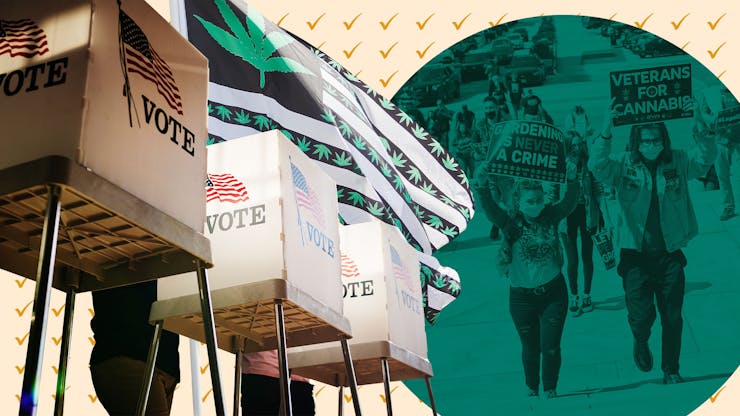“I must say that I’m too eager to put all my eggs in the federal cannabis legislation [MORE Act] basket just yet.”
A few months ago the New York Times published an article about the concept of languishing, a melancholic emotion that leaves us feeling a sense of stagnation and aimlessness. Call it a trend or call it a Covid consequence. Regardless, it’s a feeling that many of us are experiencing as the cannabis holiday of 4/20 approaches.
For many of us in the cannabis industry, that languishing feeling is directly connected to the news about the MORE Act, its recent success in the House of Representatives, and the inescapable expectation that federal legalization will wither and die in the Senate. Again.
The MORE Act may not save us

We’re approaching the 15-month mark with President Joe Biden in the White House, and many of us remember his promise to decriminalize cannabis as clearly as we remember disinfecting our groceries during the first weeks of the pandemic. We see that President Biden and his administration have done *checks notes* absolutely nothing to follow through on that decrim promise, and it’s become hard to ignore.
Now, it’s true that the House just passed the MORE Act for the second time, teeing up Senate legalization advocates like Majority Leader Chuck Schumer and New Jersey Sen. Cory Booker to move cannabis reform onto the President’s desk.
“I’m talking about helping the real people in jail for past cannabis ‘crimes,’ and those suffering the cruel aftereffects of a criminal record.”
But as Donald Glover once said: This is America. And I must say that I’m not too eager to put all my eggs in the federal cannabis legislation basket just yet. Keeping our eyes on the prize
Federal cannabis legalization measures continue to gain bipartisan support – slowly. But there are many games afoot in the Senate, and I think it’s best we keep our eyes on the prize.
You know? The actual prizes. Like social justice and a better America for future generations type of prizes.

I’m not talking about the bill traveling around Capitol Hill. I’m talking about helping the real people in jail for past cannabis “crimes,” and those suffering the cruel aftereffects of a criminal record.
I’m talking about the opportunity to invest in communities that could flourish with the investment of cannabis tax revenues. I’m talking about the restoration of human rights and civil liberties all across America. And all of that can still happen at the state and local level.
Don’t get me wrong. I love hearing about the groundswell of support for what’s happening in Congress.
But no matter what happens with the MORE Act—even if some version of it passes in the Senate—we’ve all still got plenty of work to do in our individual states, cities, and local communities.
How to decriminalize weed in your state
No matter what happens in Congress, we all still possess the power to vote for lawmakers who support cannabis decriminalization at the state and local level.
Federal legalization is important. But most people caught up in our unjustice system via the trap of cannabis criminalization are snared by local laws. They’re arrested by local cops. They’re incarcerated in county jails and state prisons.

We have the power to call out and replace local politicians who do not support:
- The elimination of harsh penalties for cannabis possession
- The automatic expungement of cannabis-related records
- Freedom for people currently incarcerated for cannabis
- The recognition of cannabis as a business that benefits local communities
Despite the languishing of federal legalization measures, we have the power to advocate for medical marijuana programs in the 13 states that still don’t have them. We can continue pushing back against stigma and stereotypes. We can improve life in our own state, our own county, our own block.
“Weed has saved us from breakups and breakdowns, from chronic health issues, and from collective bad nerves as citizens of America.”
Cannabis continues to be a unique American industry—not just because of its historical roots in racism, power, and politics, but because of the love that people have for the plant.
Weed has saved us from breakups and breakdowns, from chronic health issues, and from collective bad nerves as citizens of America. A joint can be a saving grace and a dab can turn your mood around.
But weed alone won’t save us from our languishing. If the MORE Act doesn’t make it onto Joe Biden’s desk, we have to keep up the good fight at the local level.
And you know what else? If the MORE Act does become the law of the land, we will still have to keep up the good fight at the local level. We might as well get started now.
Being our own heroes
Joe Biden may not forgive our student loans and he may not legalize cannabis. But that should not and cannot stop us from supporting the decriminalization and destigmatization of cannabis every chance we get.
“We have the ability to make change even if the MORE Act doesn’t pass in the Senate, as long as we apply our pressure in the right places.”
Cannabis is our nation’s fifth most valuable crop, and it pays the bills and keeps the lights on for nearly half a million Americans. But just like the annoying devil’s advocate who challenges me to name a cannabis product that will fix his congenital heart defect and score him a hot girlfriend by next week, I’m here to say that weed won’t fix everything.
There’s no one cannabis bill that will wipe away a historic lack of social justice in the United States.
No matter how the MORE Act plays out in the Senate this time around, we will still need to keep a close eye on how cannabis licensing programs are formed and maintained, who has access to licenses and startup capital, and guard against local counties and cities and towns discriminating against legal and licensed cannabis companies.
Legalization bills get all the glory in Congress, but power is more often exercised in local elections, city council votes, and in those boring meetings that decide issues of municipal zoning.
Incorporate the fight for cannabis justice into your new normal

Weed alone will not save us. Come on, it’s a plant!
But if you believe in the power of the cannabis plant and you’re ready tap into your own agency, then can start organizing in your state, city, or local municipality in a way that addresses the harms left by the War on Drugs and creates a pathway for cannabis businesses to thrive.
Hold your local politicians accountable at the polls. If lawmakers won’t listen, become a lawmaker yourself. Exercise more kindness to the stoners you see enjoying their day. Stop testing employees for THC. You can even join the effort to reimagine drug policy right here and right now.
Federal bills may languish, but we don’t have to.
We have the ability to make change even if the MORE Act doesn’t pass in the Senate, as long as we apply our pressure in the right places. The power is ours.





